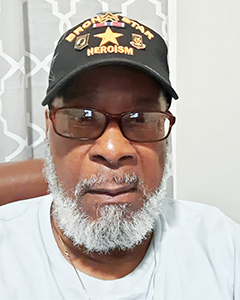Army Vietnam War Chicago, IL Flight date: 09/25/24
By Marilyn Lucas, Honor Flight Chicago Veteran Interview Volunteer
Donald Hendrick, born in 1948, grew up in The Cabrini Green complex. He was the youngest of four children. The exposure to gangs and guns did not make for a warm fuzzy childhood. He shared the story of being caught with a gun in his possession and facing a jail sentence. Fortunately, prior to his court appearance, Donald had visited an army recruiter. We were in the height of the Vietnam War. When the judge heard he was willing to enlist in the Army, he gave him the choice of jail or Army. Donald decided his time would be better spent in the service to his country.
At the age of 19, Donald was sent off to Boot Camp at Ft. Leonard Wood, Missouri, in July 1968. In December 1968, he was deployed to Vietnam serving with the 199th infantry light brigade. The 199th was concentrating their operation in the northeast part of Saigon, with the major operations centering in Long Khanh Province, a sparsely populated region dominated by rubber plantations and areas of heavy jungle. Their main missions in the province were pacification, elimination, and neutralization of enemy forces, as well as augmenting the fighting capabilities of ARVN units as part of the Vietnamization program, which was well underway in 1969.
Through the summer and fall of 1969, the units of the 199th continued to locate enemy base camps in the dense jungles of Long Lhanh. The brigade’s pressure on NVA operational capacity and Long Khanh resulted in the disruption of NVA and VC units in the area and relieved the immediate threat to Saigon.
Donald arrived in Vietnam with five pairs of new fatigues which were quickly taken away. The procedure at the base camp was to receive your laundry once a week. You accepted the fatigues you were given and wore them for six to seven days. Fit was not a priority. Adjusting to jungle life was an experience in itself. They were given five-gallon buckets to fill with water for their daily showers. An interesting fact, the GIs were not given underwear. Due to the humidity and heat there were concerns about possible jungle rot. Camouflage ponchos were also issued. These ponchos were not only used for protection from weather during the day, but also served as protective covering while sleeping. A soldier would lay flat on his back, with his gun on his stomach, while wrapping the poncho tightly around his body.

Donald‘s unit was considered Air Mobile. Helicopters would come into the base camp with the purpose of picking up soldiers and dropping them in the jungle. The platoon’s mission was to “sweep and clean up” while airstrikes and artillery were firing all around them. They were responsible for taking a body count for both Viet Cong and American soldiers along with transporting any found artillery to the waiting helicopters. These fields of bodies would later play a major part in Donald’s PTSD.
Donald recalls one occasion when he transported a wounded Viet Cong soldier (whose leg was dangling) to the waiting helicopter. It was important to move the wounded prisoner back to base camp, where he was questioned for information regarding the enemy’s locations and intentions. In order For the platoon to return to base camp a smoke canister (a color of the day) was used to signal a helicopter. The canisters were dispersed amongst the battalion so that no one person would be responsible, thus guaranteeing their return to base camp. These ambushes would last 3 to 5 days before returning to base camp.
While assigned to company B 3rd Battalion 7th infantry Donald was a forward observer with radio for the mortar platoon. He learned the “alpha bravo lingo” for radio communication while in Vietnam. Donald mentioned how important it was to lower the radio antenna periodically to prevent exposure to the enemy. The mission of the mortar platoon is to provide close and immediate indirect fire support for the maneuver battalions and companies. The platoon is responsible for carrying the gear, communications, set up, parameter security, and support of the mortars and their teams. Donald was trained in the 81 mm mortar as pictured below. A mortar platoon is an infantry battalion commander’s own personal mini artillery.
Donald was the recipient of the Bronze Star with V Devise, Bronze Star with Valor, National Defense Service Medal, Vietnam Service Medal , and Army Commendation Medal (5). He was awarded the Bronze Star for staying in combat after the entire company had pulled back. One soldier was wounded and still in the field. Donald maintained cover while his lieutenant pulled the wounded soldier to safety.
Like so many of our Vietnam vets, Donald struggled upon his return home. He spent many years homeless… moving from job to job. Finally, with the help of Hines hospital, where he worked in housekeeping, he was able to forge a positive path in his life. He sings the praises of Hines and their ability to help veterans. He met his wife, Anita, at Hines. They have been happily married for 47 years. They were on their way to Cancun to celebrate his birthday two days after this interview. Anita, who is still working for 911 and Donald, now retired, reside in Chicago. He, like others, continues to suffer from PTSD.
Unfortunately, Donald faced what so many soldiers encountered upon their return to the states. He was cautioned not to wear his uniform. Donald, we invite you to wear your hat proudly, as a member of the American Legion post 1932 Milton Olive III, named after the first black soldier to receive the Medal Of Honor in Vietnam.
Donald, thank you for your years of service to our country. Enjoy your day of honor as you experience Washington D.C…..and We look forward to WELCOMING YOU HOME!


